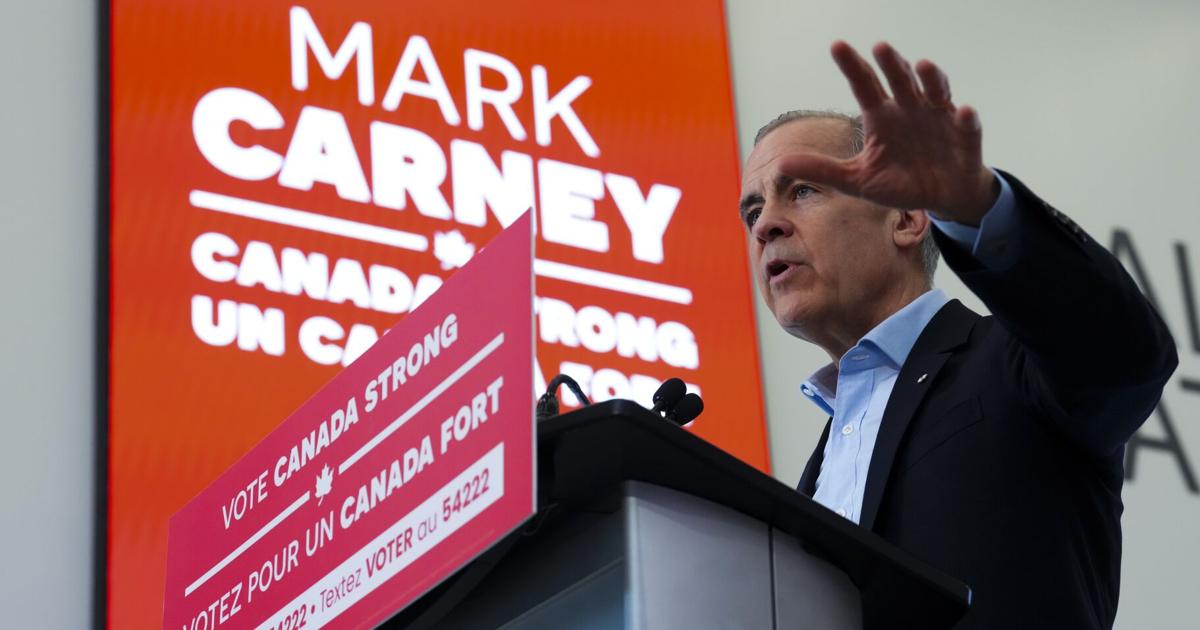Liberal Leader Mark Carney says the United States wants to use “economic pressure” to break down Canadian independence, and that voters should return his party to power to protect against American efforts to control the country’s land and resources.
Driving home his closing argument of the federal election campaign on Saturday, Carney framed voters’ choice in stark terms. While he ruled out any prospect the U.S. would use military force against Canada, he said President Donald Trump is intent on subjugating the country to American advantage in a generational crisis that demands serious leadership only he can provide.
“My question to Canadians is simple: Is Pierre Poilievre the person you want sitting across the table from Donald Trump?” Carney said, referring to the Conservative leader he disparaged as a career politician.
“I have managed budgets before. I have managed economies before. I have managed crises before,” added Carney, who served as head of Canada’s central bank during the 2008 financial crisis, as well as the governor of the Bank of England when the United Kingdom voted to leave the European Union.
“This is a time for experience, not experiments,” he said.
Ahead of Monday’s election, the Liberals raced through suburban cities around Toronto on Saturday, a densely populated region rich with swing ridings that could not only determine who takes power, but whether the next government has the expanded power of a majority in the House of Commons. Poilievre, meanwhile, was campaigning in British Columbia and is set to fly for a rally in Sudbury, Ont., before returning to campaign in the GTA and his home riding in suburban Ottawa on Sunday.
The Conservative leader has argued through the campaign that Canada needs to elect his party, alleging the Liberals have weakened the Canadian economy over a decade in power, and blaming the federal government for rising crime, drug overdoses, and the housing crisis.
“We cannot afford a fourth Liberal term. We need a change,” Poilievre said at a rally in B.C. on Friday.
But while the Liberals have also campaigned on tackling those issues, the prime focus has been on the threat of Trump’s trade war. Poilievre seized on that this week, after Radio-Canada reported that Carney did not disclose how Trump raised Canada becoming a 51st state during their only conversation since he became prime minister in March.
Poilievre has accused Carney of lying about the call and is claiming the Liberals’ “entire campaign is built on lies” to stay in power.
“If he lies about this, he would lie about inflation, taxes, crime and everything else,” Poilievre wrote on social media.
During his final press conference of the campaign at King City, Ont.‘s Seneca College on Saturday, Carney stuck to the theme of his campaign over the past five weeks. He portrayed himself as the hyper-competent economic manager ready to negotiate with an aggressive American leader, while alleging Poilievre is untested and sympathetic to the right-wing populist politics that Trump rode to the White House.
He also revealed new details of how he understands Trump and how his tariffs are upending long-held assumptions about global trade. Asked about speculation, fuelled by Trump himself, that the U.S. president might break the country’s two-term limit and run again in 2028, Carney said he believes Trump will “respect the constitution.”
He also said he doesn’t see any scenario in which the Trump-led U.S. would use military force against Canada, even if he believes Trump wants to trample over Canadian independence through a trade war designed to weaken the country and make it — as Trump has repeatedly said — the “51st” American state. Repeatedly on the campaign this week, Carney has described how Canada is under attack from the U.S., and said that Trump wants to take Canada’s water, land and resources.
“The U.S. is trying to put economic pressure on us to gain major concessions, to the extreme of a level of integration of our countries that would impinge our sovereignty,” Carney said.
“That is the goal. Take what the president says literally. I take it literally. I always have.”
Carney also reflected on the lessons of Brexit, the U.K.‘s exit from the European Union. He said the situation, which he witnessed and helped respond to as Governor of the Bank of England until 2020, is relevant to how the U.S. is now fracturing its economic links to other countries like Canada through Trump’s tariffs.
“You end up with slower growth, higher inflation, higher interest rates, volatility… weaker currency. And we’re in the early stages of that in the United States,” Carney said.
That will make the U.S. weaker as Canada’s next prime minister starts direct negotiations with the Trump administration after Monday’s election, Carney said. Both the Liberals and Conservatives have said they would engage in talks, with Carney declaring repeatedly on the campaign trail that Canada “will win” the trade war with the U.S.
Pressed on whether he is setting high expectations, Carney said Canada will lose if it gives the Americans what they want, but that the country can emerge stronger by implementing his economic plan, which includes $129 billion in new spending and tax cuts over four years to spur housing construction and speed up major development projects. Carney also claims removing trade barriers within Canada can create $200 billion in economic growth, and further enrich itself by expanding fossil fuel infrastructure and the transition to clean energy, as well as developing deeper commercial ties with other countries.
“Building Canada strong, that’s winning the trade war,” he said.
Error! Sorry, there was an error processing your request.
There was a problem with the recaptcha. Please try again.
You may unsubscribe at any time. By signing up, you agree to our terms of use and privacy policy. This site is protected by reCAPTCHA and the Google privacy policy and terms of service apply.
Want more of the latest from us? Sign up for more at our newsletter page.



